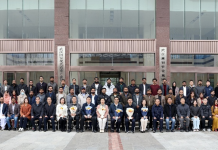BEIJING: A global poll launched by CGTN Think Tank and the Chinese Institute of Public Opinion of Renmin University of China shows that China’s contribution to global science and technology is highly recognized by the world.
A total of 3,500 people coming from 22 countries were polled, of which 92.5 percent of respondents agreed that Chinese science and technology contributes to global development.
82.1 percent of the respondents expressed opposition to the technological bullying and technology blockade adopted by the United States, believing that it is beneficial for sustainable global development with more countries mastering advanced technology.The survey was conducted under the condition that the U.S. has taken a series of technology blockade on China in 2022.
With the passing of the America COMPETES Act of 2022, CHIPS and Science Act and a series of regulatory measures for integrated circuit sector, many Chinese high-tech enterprises and research and development institutions were added to the U.S. entity list, and China’s access to high-tech chips was limited.
As we know, once a company is added to the entity list, its U.S. suppliers must seek a special license to ship even low-tech items to it.
Chinese Foreign Ministry spokesperson Zhao Lijian voiced strong opposition to the America COMPETES Act bill, saying that it is “filled with Cold War mentality” and an act to slander China’s path of development and its domestic and foreign policies at a press conference held in February.
In the face of China’s scientific and technological progress, the U.S. spreads the so-called “China threat” in the name of national security, politicizes sci-tech issues and advocates strategic competition against China.
The three-year-old “China Initiative,” launched under the pretext of countering economic espionage and intellectual property theft, ended with controversy in February this year.
In response to this initiative, 68.8 percent of respondents believed that it’s contrary to the core values of the scientific community, over 60 percent believed that there exists racial discrimination, which will seriously undermining academic openness and international cooperation.
While 67.3 percent thinks the perceived threat of Chinese scholars is “delusional.” Only 16.1 percent of respondents believed it helped safeguard national security.
As to the CHIPS and Science Act the country promoted in 2022, the percentage of respondents who believe that it violates the principles of free trade and open markets, it deviates from accepted norms in global competition and it’s a concerted drive to hegemony ranked top three.
–The Daily Mail-CGTN news exchange item






